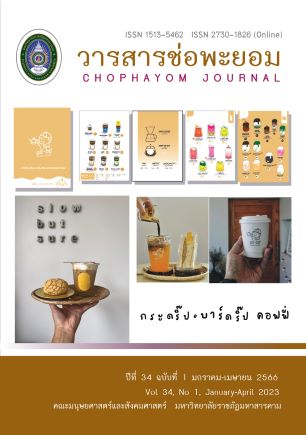Adaptation of New Normal Community in the Coronavirus Pandemic Situation in Surat Thani Province
Keywords:
Community-based adaptation, new normal communities, COVID-19Abstract
This research project aimed to explore the impact and adaptation of people in the situation of the coronavirus (COVID-19) epidemic towards the adaptation of the new normal community in Surat Thani Province. The study is quantitative research and using questionnaire as data collection tool. Using random sampling from people in 3 districts, namely, Mueang Surat Thani, Koh Samui and Ban Na Doem. The collected data were analyzed using descriptive statistics consisting of percentage and hypothesis testing using F-test and t-tests to make the comparisons. The results of the research showed that 1) comparison of the first and subsequent outbreaks of COVID-19, it was found that the impact on the economy was greater in all aspects. In terms of health, there was more infection prevention and health care, while there was an increase in stress/anxiety compared to normal situations. In terms of social and environmental aspects, the COVID-19 situation did not affect the relationship of household members. In the field of information technology, most people have access to the same information sources, however, new technologies are being learned while the risk of perceiving false information increases. And in terms of education, online learning and the cost of online learning were the issues that had the greatest impact on households. 2) the adaptation of the people, in terms of economy, most of them continue to operate the same business and do not develop themselves by creating or upgrading their existing skills. However, there is an adaptation using online self-learning and home cooking. In terms of health, there is an adaptation by emphasizing on eating freshly cooked food, washing hands with water and soap or alcohol gel, and wearing a mask. On the social and environmental aspect, the use of social media and the use of telephones increases, while in the field of information technology, there is an adaptation by learning to use communication devices on their own, and in terms of education, there is an adaptation by allowing family members to allocate the most time to teach and take care of their children. Keywords: Community-based adaptation, new normal communities, COVID-19
References
กายสิทธิ์ แก้วยาศรี และบุญมา สุนทราวิรัตน์. (2563). แนวทางการดําเนินงานและผลกระทบจากโรคติดเชื้อโคโรนาไวรัส (โควิด-19) จังหวัดเลย. วารสารวิชาการสาธารณสุขชุมชน, 7(1). 16-34.
ธนเดช ชัยรักษา และคณะ. (2565). การปรับตัววิถีใหม่ของประชาชนในช่วงโควิค-19 กรณีศึกษา ผู้ได้รับผลกระทบถูกเลิกจ้างงานชุมชนควนสะตอ ตำบลบางรูป อำเภอทุ่งใหญ่ จังหวัดนครศรีธรรมราช. วารสารสังคมพัฒนศาสตร์, 5(1).15-27.
ธานี กล่อมใจ, จรรยา แก้วใจบุญ และทักษิกา ชัชวรัตน์. (2563). ความรู้และพฤติกรรมของประชาชนเรื่องการป้องกันตนเองจากการติดเชื้อไวรัสโคโรนา สายพันธุ์ใหม่ 2019. วารสารการพยาบาล การสาธารณสุขและการศึกษา, 21(2). 29-39.
บุญชม ศรีสะอาด และคณะ. (2558). พื้นฐานการวิจัยการศึกษา. พิมพ์ครั้งที่ 7. กาฬสินธุ์: ตักสิลาการพิมพ์
ล้วน สายยศและอังคณา สายยศ. 2543. เทคนิคการวิจัยทางการศึกษา. พิมพ์ครั้งที่ 3. กรุงเทพฯ: สุวีริยาสาส์น.
อวาทิพย์ แว. (2563). COVID-19 กับการเรียนรู้สู่การปรับเปลี่ยนพฤติกรรมสุขภาพในวันนี้. วารสารสมาคมวิชาชีพสุขศึกษา, 35(1). 24-29.
สถาบันวิจัยเพื่อการพัฒนาประเทศไทย. (2564). ผลกระทบทางสังคมของการระบาดโรคโควิด-19 ระลอกใหม่และมาตรการที่ควรมี. สืบค้นเมื่อ 19 มีนาคม 2565, จาก https://tdri.or.th/2021/01/impact-of-new-covid-19-wave/
สุนันทา คันธานนท์ และคณะ. (2564). การปรับตัวของชุมชนวิถีใหม่ในสถานการณ์การระบาดของโรคโควิด-19 ในจังหวัดกระบี่. การประชุมวิชาการระดับชาติมหาวิทยาลัยราชภัฏภูเก็ต ครั้งที่ 13 “การบูรณาการสหวิทยาการเพื่อการพัฒนาท้องถิ่น”. วันที่ 15 มิถุนายน 2564 ณ มหาวิทยาลัยราชภัฏภูเก็ต จังหวัดภูเก็ต.
World Health Organization. (2020). Effects of COVID-19 on business and research. Journal of Business Research. 117(June), 2484-2489. Retrieved from doi.org/10.1016/j.jbusres.2020.06.008.
Downloads
Published
How to Cite
Issue
Section
License
Copyright (c) 2023 Chophayom Journal

This work is licensed under a Creative Commons Attribution-NonCommercial-NoDerivatives 4.0 International License.






